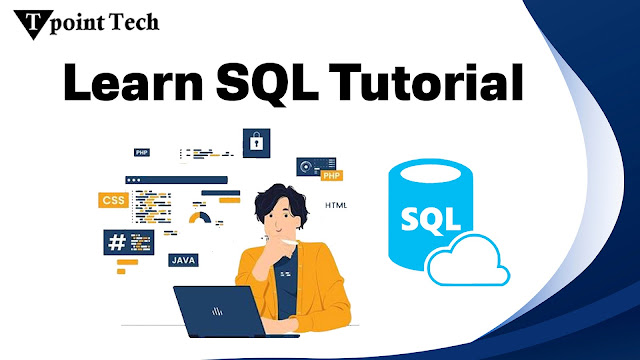Beginner’s Guide to SQL: A Practical Tutorial for Everyone
In today's data-driven world, knowing how to manage and retrieve data effectively is a valuable skill across almost every profession. Whether you’re working in IT, marketing, finance, or even healthcare, understanding databases gives you a strong edge. That’s where SQL comes in — the standard language used to communicate with databases.
This SQL Tutorial is designed to provide a simple and clear understanding of what SQL is, why it matters, and how you can start learning it effectively. Whether you're a complete beginner or just looking to strengthen your foundation, this guide is your starting point. And if you’re looking for structured, hands-on learning, Tpoint Tech, a leading IT training institute based in Noida, India, offers practical and flexible learning options both online and offline.
What is SQL?
SQL stands for Structured Query Language, and it is used to interact with relational databases. Simply put, SQL helps you store, retrieve, update, and delete data from databases in an organized and efficient manner.
Think of it as the bridge between you and the huge datasets stored in business systems, customer portals, or financial records. SQL allows you to ask specific questions about your data and get precise answers—almost like having a conversation with your database.
Why Should You Learn SQL?
There are several compelling reasons to learn SQL tutorial content, especially if you want to work with data in any capacity:
-
Universal Usage: SQL is used in virtually every industry—from e-commerce to education, banking, and healthcare.
-
High Demand: Job roles like Data Analyst, Database Administrator, Business Analyst, and Software Developer often list SQL as a must-have skill.
-
Compatibility: SQL works with most relational database systems such as MySQL, PostgreSQL, Oracle, and Microsoft SQL Server.
-
Powerful Yet Simple: SQL is easier to grasp compared to other programming languages, making it perfect for beginners.
-
Improves Decision-Making: Knowing how to extract and analyze data gives you better insights, leading to more informed business decisions.
At Tpoint Tech, we emphasize real-world applications, ensuring that our students not only understand SQL but also know how to apply it in real job scenarios.
Key Concepts in an SQL Tutorial
Understanding SQL becomes easier when you break it down into manageable parts. Here are the basic concepts typically covered in a beginner-friendly SQL tutorial:
1. Databases and Tables
Databases store information in a structured way using tables, which are like spreadsheets with rows and columns. Each table holds data related to a specific subject, such as customers or products.
2. Queries
A query is a question you ask the database to retrieve specific data. For example, you might want to know which customers purchased a certain product last month.
3. Filtering Data
SQL allows you to apply conditions to your queries to narrow down the results. This is useful when dealing with large datasets.
4. Sorting and Grouping
You can organize data by sorting it (e.g., from newest to oldest) or by grouping it based on a common field (e.g., total sales by region).
5. Updating Records
SQL isn’t just about viewing data—you can also use it to make changes or corrections.
6. Data Integrity
Learning about data types, constraints, and keys helps ensure your data remains accurate and secure.
Learn SQL Tutorial: A Step-by-Step Approach
Starting your SQL journey doesn’t have to be overwhelming. Here’s how you can gradually build your skills:
Step 1: Understand the Basics
Start by learning what a database is and how data is organized within it. Get familiar with common terms like records, fields, and tables.
Step 2: Explore Real-World Scenarios
Use examples from your daily life. For instance, think about how a library database might store books, authors, and members. This makes abstract concepts more relatable.
Step 3: Practice with Sample Data
While this blog avoids technical code, hands-on practice is essential. Using sample databases or training platforms like the one provided by Tpoint Tech can help you apply what you've learned in a risk-free environment.
Step 4: Work on Projects
Small projects, such as creating a contact list or a product inventory, can reinforce your learning and give you practical experience.
Step 5: Join a Course
To fast-track your learning, join a guided training program. Tpoint Tech offers beginner-friendly SQL courses with expert mentorship, real-time projects, and career support.
Real-Life Applications of SQL
SQL is not just a technical skill; it solves real business problems. Here’s how SQL is used in everyday situations:
-
Marketing Teams use SQL to pull customer data for targeted campaigns.
-
Finance Departments use it to analyze transactions and detect unusual patterns.
-
E-commerce Platforms rely on SQL to track inventory and sales performance.
-
Healthcare Providers use SQL to manage patient records securely and efficiently.
-
HR Professionals use SQL to generate reports on employee performance and payroll.
By learning SQL, you're equipping yourself with a skill that's both valuable and widely applicable.
Why Learn with Tpoint Tech?
At Tpoint Tech, we pride ourselves on making technical skills accessible and practical. Our SQL training programs include:
-
Industry-expert instructors with real-world experience
-
Hands-on learning through live projects
-
Flexible timing with both online and offline classes
-
Structured curriculum tailored for beginners
-
Placement assistance to help launch your career
Our mission is to help you not just learn, but truly understand and apply SQL in meaningful ways.
Final Thoughts
Learning SQL opens up a world of possibilities, whether you're aiming for a tech role or simply want to make more data-driven decisions in your current job. This SQL tutorial has given you an overview of key concepts, practical applications, and a clear roadmap to get started.
If you're serious about mastering SQL and applying it in real life, consider enrolling in the beginner-friendly SQL programs at Tpoint Tech. With the right guidance, practice, and support, anyone can learn SQL and use it to unlock new career opportunities.




Comments
Post a Comment